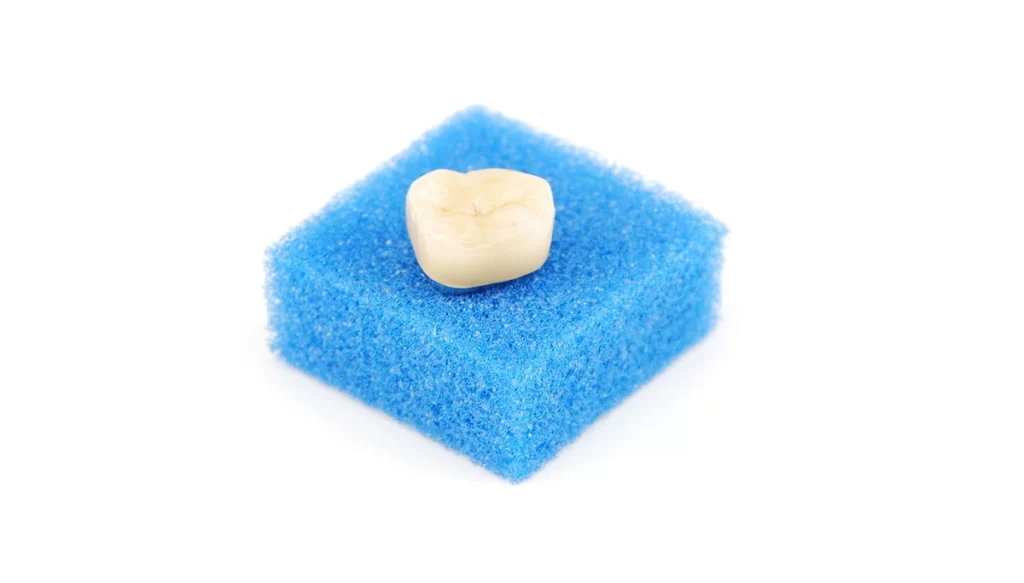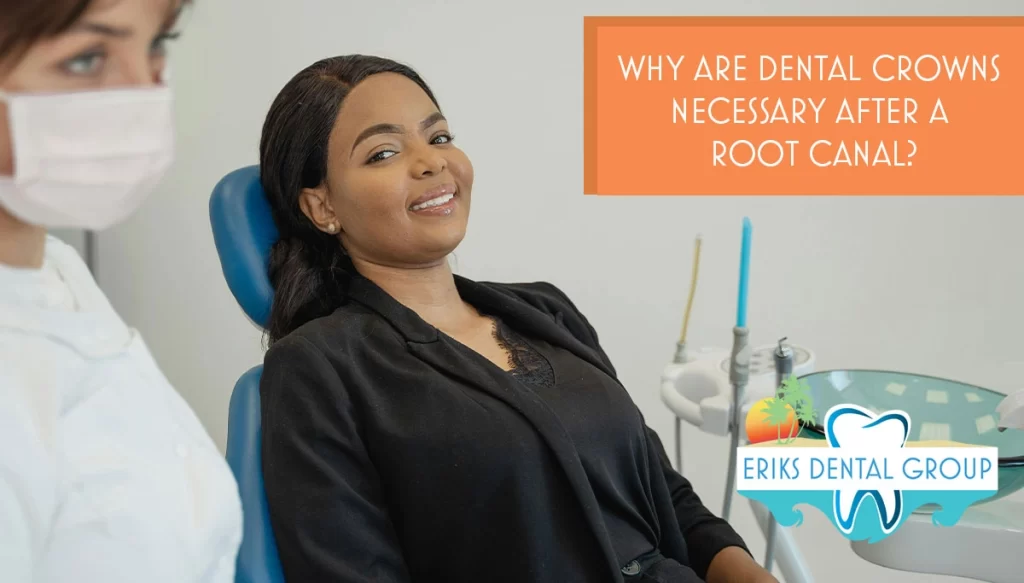When your dentist recommends a root canal, they’re essentially saving your tooth from extraction by removing infected pulp and nerves from inside the tooth. According to the American Association of Endodontists, more than 15 million root canals are performed annually in the United States. This remarkable procedure is the first step in restoring your complete dental health.
A root canal successfully addresses the internal infection, while adding a dental crown completes the restoration process by providing essential external protection. The crown strengthens your treated tooth, prevents fractures, and helps maintain its natural appearance. This combination of treatments, root canal therapy followed by a dental crown, represents a comprehensive approach to dental care.
Reasons to Get Dental Crowns After a Root Canal

When you’re considering getting dental crowns, you may be wondering what the benefits are and why they might be necessary for your specific situation. Here are some compelling reasons to consider a dental crown after a root canal:
Protect Against Fractures
A root canal weakens a tooth by stripping it of its natural hydration, making it more prone to fractures. Without protection, everyday biting and chewing can cause cracks, chips, or even complete breakage. A dental crown reinforces the structure, acting as a protective shell that absorbs pressure and prevents damage.
A well-fitted crown restores strength by evenly distributing force across the tooth. This reduces stress on any single area, lowering the risk of fractures. With the right fit, the tooth remains functional and durable, allowing for normal chewing without discomfort or worry.
Prevent Reinfection
Treating an infected tooth with a root canal removes harmful bacteria, but the procedure leaves behind a hollowed-out structure. Without protection, tiny gaps can allow saliva and food particles to seep in, creating an opportunity for reinfection. A dental crown forms a protective seal, shielding the tooth’s interior and keeping bacteria out.
Sealing the tooth is essential for maintaining long-term oral health. A properly fitted crown not only reinforces the structure but also ensures the treated area remains secure. With durable materials and precise placement, the risk of future infections significantly decreases, preserving both function and stability.
Improve Tooth Appearance

Discoloration can occur after a root canal, altering the natural look of a tooth and affecting overall smile aesthetics. A dental crown provides an effective solution by covering the treated tooth with a lifelike restoration. Designed to match the surrounding teeth, it restores a uniform and natural appearance.
Modern crowns are crafted with advanced materials that mimic the translucency and shade of natural enamel. When properly fitted, they blend seamlessly into the smile, improving both confidence and function. Beyond protection, a well-designed crown helps maintain a bright, cohesive look.
Enhance Tooth Strength
A tooth that undergoes a root canal loses some of its original strength, making it more vulnerable to pressure and wear. Without reinforcement, daily activities like chewing and biting can strain the tooth, increasing the risk of damage over time. A dental crown restores stability by encasing the tooth, providing the support needed for normal function.
With a secure bond, the crown absorbs pressure and distributes force evenly, preventing undue stress on the weakened structure. This added reinforcement allows for comfortable chewing and speaking without worry. A professionally fitted crown ensures the tooth remains durable and functional for years.
Restore Proper Bite and Alignment
A weakened or damaged tooth can disrupt the natural balance of your bite, leading to uneven pressure on surrounding teeth. Over time, this imbalance may cause discomfort, jaw strain, or even shifting of adjacent teeth. A dental crown restores the tooth’s original shape and size, helping maintain proper alignment and function.
Your crown supports a balanced bite and reduces unnecessary stress on the jaw by ensuring even contact with opposing teeth. This reinforcement promotes long-term oral health by preventing misalignment issues that could lead to further complications.
Factors Influencing the Decision to Place a Crown
Now that you know a crown is often recommended after a root canal, how do you and your dentist decide if it’s the right choice for you? Several factors come into play, including the extent of damage, the tooth’s location, and its role in your bite. A crown provides necessary reinforcement for back teeth that endure heavy chewing forces, while a veneer may be an option for front teeth where aesthetics are the primary concern. Here are some of the factors to consider
Tooth Location
Where the tooth is located in your mouth makes a big difference. Front teeth (anterior teeth) have different needs than back teeth (posterior teeth). Molars and premolars, located in the back of your mouth, handle most of the chewing and grinding. This means they experience significantly higher stress and functional demands compared to front teeth. Because of this, back teeth that have had root canals are much more likely to need the extra protection of a crown.
Extent of Tooth Damage
The amount of tooth structure remaining after the decay is removed and the root canal is performed is a critical factor. If a significant portion of the tooth is already compromised due to a large filling, fracture, or extensive decay, a crown is often the best way to restore its strength and prevent further damage.
Also, the severity of the initial infection or decay plays a role. A tooth with a history of extensive decay may be more susceptible to future problems, making a crown a more proactive solution.
Patient’s Oral Habits
Your oral habits also significantly impact the decision. Do you grind or clench your teeth? This habit puts tremendous pressure on your teeth, increasing the risk of fractures and damage. A crown can provide extra protection against these forces. Dietary habits also play a role.
A diet high in acidic foods or sugary drinks can weaken tooth enamel, making a crown a wise choice for added protection.
Protect Your Smile After a Root Canal

Choosing the right treatment after a root canal is essential for ensuring the long-term health and beauty of your smile. Whether dental crowns are the best option for you or an alternative solution is more appropriate, the team at Eriks Dental Group is here to guide you. To discuss your individual needs and explore your options, call us at 561-733-4004.
We are conveniently located in Boynton Beach and are dedicated to providing exceptional dental care for the whole family. Schedule your consultation today at our comfortable, state-of-the-art office at 3399 Woolbright Rd.

